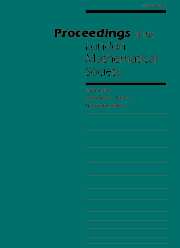Article contents
MODEL CATEGORIES OF DIAGRAM SPECTRA
Published online by Cambridge University Press: 05 March 2001
Abstract
Working in the category $\mathcal{T}$ of based spaces, we give the basic theory of diagram spaces and diagram spectra. These are functors $\mathcal{D}\longrightarrow \mathcal{T}$ for a suitable small topological category $\mathcal{D}$. When $\mathcal{D}$ is symmetric monoidal, there is a smash product that gives the category of $\mathcal{D}$-spaces a symmetric monoidal structure. Examples include \begin{enumerate} \item[] prespectra, as defined classically, \item[] symmetric spectra, as defined by Jeff Smith, \item[] orthogonal spectra, a coordinate-free analogue of symmetric spectra with symmetric groups replaced by orthogonal groups in the domain category, \item[] $\Gamma$-spaces, as defined by Graeme Segal, \item[] $\mathcal{W}$-spaces, an analogue of $\Gamma$-spaces with finite sets replaced by finite CW complexes in the domain category. \end{enumerate} We construct and compare model structures on these categories. With the caveat that $\Gamma$-spaces are always connective, these categories, and their simplicial analogues, are Quillen equivalent and their associated homotopy categories are equivalent to the classical stable homotopy category. Monoids in these categories are (strict) ring spectra. Often the subcategories of ring spectra, module spectra over a ring spectrum, and commutative ring spectra are also model categories. When this holds, the respective categories of ring and module spectra are Quillen equivalent and thus have equivalent homotopy categories. This allows interchangeable use of these categories in applications.
2000 Mathematics Subject Classification: primary 55P42; secondary 18A25, 18E30, 55U35.
Keywords
- Type
- Research Article
- Information
- Copyright
- 2001 London Mathematical Society
- 191
- Cited by


